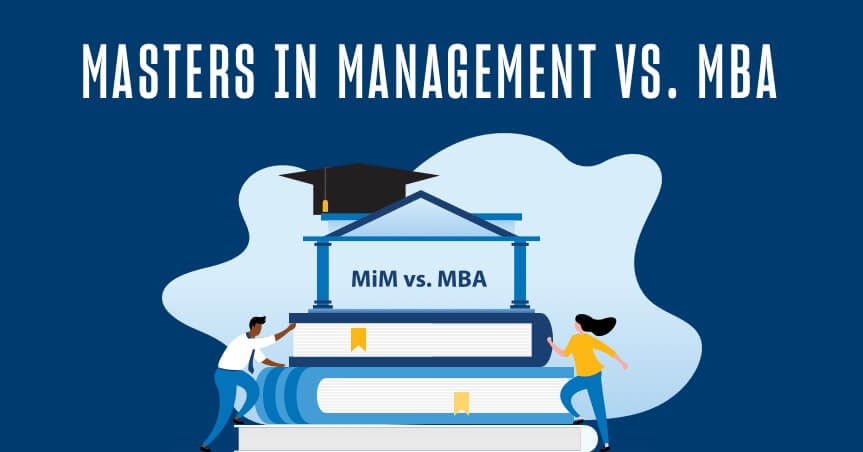For many young professionals, the Master of Business Administration continues to be the most popular choice for an advanced degree. According to the National Center for Education, a reported 197,089 students earned an MBA in the 2018-2019 academic year – 51,000 more graduates than the next most popular degree. The reason is simple enough: money. In 2019 the average salary for an MBA graduate in the U.S. was $134,991 and business-related occupations are among the highest-paid career paths.
Several high-level positions require candidates to possess an MBA degree in order to apply. However, if your interest in an MBA degree lies mostly in building business skills and not necessarily the degree itself, then there could be MBA alternatives more fitting for your needs and interests.
Get Your Guide: How To Choose An Online Master’s Degree (w/ Free Program Comparison Worksheet)
The Challenge of Full-Time MBA Programs
Full-time MBA degree programs are a full-time commitment, which means a heavy investment of both time and money. Full-time MBA tuition typically costs over $100,000 when accounting for additional expenses such as boarding and fees. Renowned full-time MBA programs are especially expensive, and a full two-year program can easily cost upwards of $200,000:
- Harvard MBA estimated cost: $223,636
- Stanford MBA estimated cost: $237,288
- Wharton MBA estimated cost: $222,540
- Cornell MBA estimated cost: $199,520
The full-time commitment for earning the necessary number of credits means there’s little to no flexibility for earning a salary during those years. Without a scholarship or grant, your expenses will need to be paid out of pocket or through loans. If you do maintain a full-time job, then a part-time MBA degree program could allow work and study, but this option can take up to five years to finish.
If your interest in an MBA is learning applicable skills, then there are some alternatives that can be faster, less expensive and more focused on your intended career paths or personal interests.
1) Mini MBA Programs
So-called “mini MBA programs” provide instruction on business essentials – usually the most important topics and courses – for fewer credit hours than a full-time degree program (usually between 35-40 credit hours). Depending on the school, courses can be completed in as little as a week and the full mini MBA program in under 6 months. Since they require fewer credit hours, mini MBA programs are also less expensive than full degree programs.
Mini MBA programs offer certificates to graduates rather than a full master’s degree, so if you’re looking for positions that require the actual degree, then this really isn’t an option. A mini MBA is most useful for those looking for specific benefits out of a program and either are unable to or don’t want to commit to a full-time program. This can include:
- Mid- to upper-level professionals who are looking to receive more specialized training in order to advance in their profession.
- Aspiring professionals who are interested in full-time programs and want to explore the material before fully committing.
- Managers with no prior business school experience or degree interested in learning important business fundamentals.
- Previous MBA graduates who are looking to refresh their skills or get caught up on new trends and practices.
In addition to fundamental topics, mini MBA programs can offer courses in specialized fields like Management, Business Administration, Executive Development or cover topics like Digital Marketing, Supply Chain Management and Developments in Healthcare or Pharma. Admission requirements are less strict than a full-time program, though some mini MBA programs might require applicants to have established work or “professional” experience to be accepted into the program.
2) Massive Open Online Courses (MOOCs)
Massive Open Online Courses – or MOOCs – are online courses that are offered for anyone to enroll in for free or for a nominal fee. MOOCs are offered by individual universities and companies or through unique partnerships between higher education institutions and/or private enterprises. All types of subjects are offered as MOOCs, from humanities and languages, to computer science, business and management courses.
MOOCs are only accessible online and the courses consist of video lessons, readings, assessments and forums offered within a digital online environment. They are distributed through larger platforms that specialize in professional development. Course providers include:
- Coursera – one of the largest open course providers in the world, Coursera’s catalogue spans over 3,900 courses and specializations.
- edX – featuring an open-source learning platform, edX provides more than 2,500 courses across both science and the humanities.
- Udacity – specializing in technical and vocational courses, Udacity’s courses are designed to cater to working professionals.
- Udemy – Udemy has over 150,000 different courses, both free and paid, making it the largest and broadest online course provider.
MOOCs range in length from a single week to several months, depending on the topic and complexity of the course. MOOCs offer certifications, not degrees, and so will not qualify graduates for positions that require a degree. While free MOOCs can offer personal development and teach useful skills, generally only the paid versions will offer academic credit – and no universities or colleges are guaranteed to accept those credits.
As an MBA alternative, MOOCs work well as a way to survey possible industries or fields of study that you’re interested in. They’re a convenient means of supplementing other learning programs, or earning a specific certificate that might be required for your career.
3) MBA Certificate Programs
MBA certificate programs are the most traditional alternative to full MBA programs. Like other alternatives they are a faster and less expensive way of learning new skills compared to full degree programs, often designed to be completed within a single school semester. Certificates are focused coursework, making them similar to concentrations from larger programs. MBA certificate programs offer extremely focused learning meant for specific job titles and career paths.
Certificate programs are mostly used to prove specific competencies rather than general business acumen. Some of the more common and popular MBA certificate programs include: finance, leadership, human resource management, marketing and business analytics. As such, they’re helpful for those who are considering a specialized MBA degree and want to try out the course (and earn credits towards a full degree) or for MBA graduates who want to further their business, management or technical skills.
Get Your Guide: How To Choose An Online Master’s Degree (w/ Free Program Comparison Worksheet)
4) Online Accelerated Degree Programs
Accelerated MBA degree programs take less time to complete than full-time programs, ranging from 12–20 months. They’re offered either as fully online or hybrid online/offline degrees, allowing for greater flexibility in how and when students can take the required courses. Because they’re shorter and don’t carry the same associated costs as full-time degrees, they’re also less expensive.
Unlike other alternatives like MOOCs, certifications or mini MBAs programs, accelerated degree programs are fully recognized as master’s degree programs. Some accelerated degree programs also are designed as specialized degrees that offer the best business elements of an MBA program with elements from another field – like technology – that can align more closely with your interests and ambitions.
The University of San Diego’s Master of Science in Innovation, Technology and Entrepreneurship is one such program that’s built upon cross-functional leadership training, perhaps one of the only master’s degree programs that is jointly awarded by the schools of Business and Engineering. The USD MITE curriculum is designed to teach both fundamental and advanced business models that apply to the field of technology innovation.
This MBA alternative provides a great “real world” experience through an in-depth capstone experience that offers students the opportunity to develop and pitch a business startup and then receive invaluable feedback. The MITE program is designed around providing students a space to apply knowledge and skills to solve day-to-day and strategic challenges through an entrepreneurial and innovation-minded approach. The course and program requirements make the MITE program ideal for tech-minded startup creators, forward-thinking business leaders and rising intrapreneurs.
5) Entrepreneurship
If your ultimate goal is to start your own business, then it could be possible to skip a degree or certification program and just jump right into the process. While MBAs provide useful skills and knowledge relating to finance, marketing and business management, it’s not a requirement if you’re going to run your own business. Provided, of course, that you possess the skills, knowledge and support you’ll need to get things up and running.
Starting a business is a true “trial by fire” and is certainly the riskiest MBA alternative. If you’re thinking of going this route, then consider reading more about the recommended steps for starting your own business. You can also look into joining a group that helps connect and develop entrepreneurs, like the Entrepreneurs’ Organization, the Young Entrepreneur Council or Startup Grind.
If you’re interested in creating a startup, but are unsure of how to get started, you could always choose a degree program that’s designed around teaching fundamentals of business creation and development. The MITE program is focused on providing instruction on fundamental business concepts and practices paired with details on technological innovation and financing. This degree program could be a perfect fit for aspiring entrepreneurs in the tech industry.
How to Pick the Right MBA Alternative

While cost and location are major factors in considering what type of program to pursue, they’re not the only, or even the most important ones. If you’re unsure of how to go about deciding what alternative might be right for you, consider the following points:
Determine what is your five-year goal:
- What position would you like to be in at the end of those five years?
- How much salary would you be comfortable earning during that time frame?
- Which degree or certificate gets you where you want to be?
- Do you want to own a business, or are you comfortable working for someone else?
- Discuss your ideas with your partner or with friends for additional insights and input.
- Do the research on different programs to determine what your possible options are.
Budget out what your different options could be:
- How much would your first choice MBA program be? Your second choice? Your tenth?
- How much would it cost to earn an alternate degree or certificate?
- Are you able to work while studying, either full or part time?
- What grants and scholarships are available to you?
- How long are you comfortable paying back loans? What’s an acceptable interest rate?
Start asking specific questions:
- What skill sets are critical to succeeding in your current or desired organization?
- What work experiences, training and exposure will most help you develop these skills?
- Are you advancing within a field or looking to transition to a new industry?
- Are you looking for education in general business practices or to study within a more specialized field?
- Does the career that you’re most interested in require an MBA, or are alternatives accepted?
- Are the programs you’re looking into accredited and are those credits likely to be recognized by businesses or other educational institutions?
Answering these questions will help to eliminate what’s not going to work best for you. Once you have your short list of options, try reaching out to current students or alumni to get their “inside” opinion on a program. Contact a program directly with any specific questions you might have about their program of study or financial aid assistance they can provide.
While an MBA will provide a strong base for general business skills and knowledge, it’s up to you to decide if your investment of time and money is better spent on other alternatives.
Get Your Guide: How To Choose An Online Master’s Degree (w/ Free Program Comparison Worksheet)




